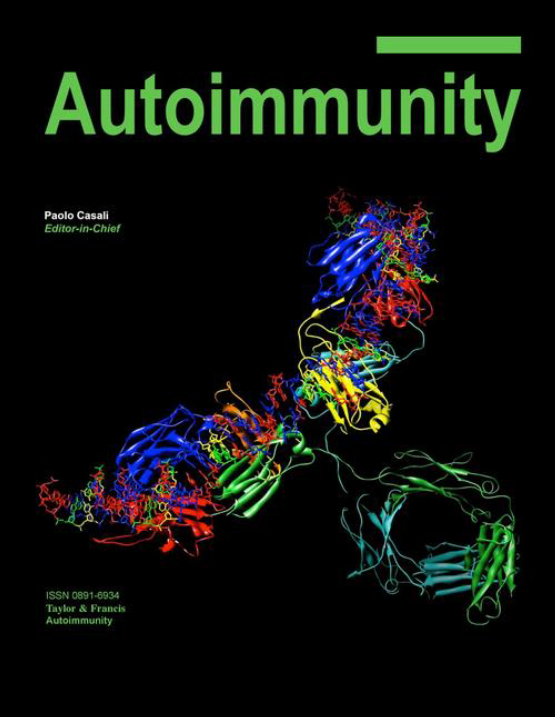Submit a Manuscript to the Journal
Autoimmunity
For an Article Collection on
T Cells in Autoimmune Diseases: Novel Subsets and Pathological Roles
Manuscript deadline
15 July 2024


Article collection guest advisor(s)
Prof. Hans Dooms,
National Jewish Health and University of Colorado Anschutz Medical Campus
[email protected]
T Cells in Autoimmune Diseases: Novel Subsets and Pathological Roles
Autoimmune diseases remain a source of significant human suffering and a burden on healthcare systems. For reasons that are not clear, but which likely involve environmental and dietary factors, the incidence of many autoimmune diseases is globally on the rise. Although some immunomodulatory drugs have shown considerable success in controlling certain autoimmune diseases, other conditions remain largely untreatable.
Autoimmune diseases are caused by inappropriate immune responses targeting the organism’s own tissues. While many immune cell types contribute to their pathogenesis, autoimmune diseases are typically driven by adaptive immune cells, and present with autoantibodies and autoreactive T cell clones.
Recent technical advances, including the use of single cell transcriptomics, multi-dimensional flow cytometry, spatial biology and bioinformatics, have led to the identification of novel T cell subsets involved in autoimmunity. Ever more refined and detailed analyses of those specific subsets that are expanded, deficient or dysregulated in autoimmune diseases are leading to novel insights in disease etiology and pathogenesis.
The discovery of novel T cell subsets and their physiological role in autoimmune diseases will allow for a more targeted therapeutic approach with greater efficacy and reduced side effects. Causative autoreactive T cell populations can become targets for novel antigen-specific approaches, cellular therapies or precision immunomodulators, with the ultimate goal of curing these devastating conditions.
This Article Collection describes novel T cell subsets and their roles in both systemic and organ-specific autoimmune diseases. We welcome Research Articles, Review Articles, and Brief Reports that cover the basic biology, clinical relevance, and translational applications of T cells in autoimmunity.
All manuscripts submitted to this Article Collection will undergo full peer-review; the Guest Advisor will not be handling submitted articles. Please review the journal’s aims and scope and author instructions prior to submission.
You may submit your manuscript through Taylor & Francis's Submission Portal.
During the first step of the submission process (under the "Manuscript Details" heading), you will find the question "Are you submitting your paper for a specific special issue or article collection?" Click the radio button for "Yes".
Next, you will be prompted to select the "Special Issue or Article Collection name" from the dropdown menu. Choose "Animal Models of Autoimmune Diseases" from the list. This will ensure that your manuscript is considered for inclusion.
The manuscript submission deadline is July 15, 2023.
If you have any questions about this Article Collection, please contact Krista Thom at [email protected].
Guest Advisor:
Prof. Hans Dooms did his doctoral studies at the University of Ghent in Belgium and was a postdoctoral fellow at the University of California San Francisco. He is currently a faculty member in the Department of Immunology and Genomic Medicine at National Jewish Health where his laboratory studies how dysregulation of pathogenic and protective T cells causes autoimmunity. His laboratory is specifically focused on the mechanisms underlying Type 1 Diabetes and Systemic Sclerosis/Scleroderma. The goal is to identify novel factors and pathways that enable autoreactive T cells to escape immune regulatory checkpoints and cause tissue damage, and to use this knowledge for the development of innovative immunotherapies.
Disclosure Statement: Prof. Dooms declares no conflict of interest.
Benefits of publishing open access within Taylor & Francis
Global marketing and publicity, ensuring your research reaches the people you want it to.
Article Collections bring together the latest research on hot topics from influential researchers across the globe.
Rigorous peer review for every open access article.
Rapid online publication allowing you to share your work quickly.
Looking to Publish your Research?
Find out how to publish your research open access with Taylor & Francis Group.
Choose open accessSubmission Instructions
All manuscripts submitted to this Article Collection will undergo desk assessment and peer-review as part of our standard editorial process. Guest Advisors for this collection will not be involved in peer-reviewing manuscripts unless they are an existing member of the Editorial Board. Please review the journal Aims and Scope and author submission instructions prior to submitting a manuscript.